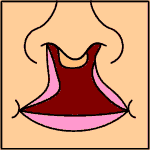Cleft Lip and Cleft Palate
Cleft lip and cleft palate are congenital deformities that occur when tissues in the face and mouth do not fuse properly during foetal development. This can lead to significant complications affecting feeding, speech, hearing, and overall quality of life.
The condition is typically present at birth and can often be diagnosed prenatally through ultrasound. Treatment usually involves multiple surgeries, speech therapy, and dental care, and outcomes are generally good with comprehensive management.
Signs and Symptoms
Cleft lip and cleft palate are characterised by openings in the upper lip or roof of the mouth. A cleft lip may present as a small gap or indentation in the upper lip or extend into the nose, occurring unilaterally or bilaterally. A cleft palate involves an opening in the roof of the mouth that may extend to the nasal cavity. These conditions often lead to feeding difficulties, speech problems, hearing issues, and frequent ear infections.




Diagnosis
Diagnosis is often made at birth through physical examination, but advances in prenatal imaging allow for detection via ultrasound. Accurate prenatal diagnosis helps in planning early interventions and educating parents. In some cases, genetic testing may identify associated syndromes.
Treatment
Treatment for cleft lip and palate is multidisciplinary and lifelong, often involving surgeons, orthodontists, speech therapists, and other specialists. Surgery to repair a cleft lip is usually performed within the first few months of life, while cleft palate repair is typically done before 18 months. Ongoing dental care and speech therapy are very important for addressing complications related to speech and oral health.



Complications
Complications arising from cleft lip and palate include feeding difficulties due to lack of suction, leading to poor weight gain and malnutrition. Ear infections and hearing loss are common, necessitating regular monitoring and possible surgical interventions like tympanostomy tubes. Speech issues often require long-term therapy to address articulation and resonance problems.

Psychosocial Issues
Living with cleft lip and palate can impact self-esteem and social interactions, particularly as children grow older. Early intervention and support from parents and healthcare providers can mitigate these effects. Adolescents may face additional challenges related to appearance and social acceptance.
Cause
The exact cause of cleft lip and palate is often unknown, but both genetic and environmental factors play roles. Genetic factors contribute to 20%-50% of cases, with several genes identified, including IRF6 and MSX1. Environmental risk factors include maternal smoking, diabetes, obesity, and certain medications.
Images


Epidemiology
Cleft lip and palate occur in about 1 to 2 per 1000 births in the developed world, with variations between ethnic groups. Native Americans and Asians have the highest prevalence, while Africans have the lowest. The condition caused about 3,800 deaths globally in 2017, a significant decrease from 14,600 deaths in 1990.



Self-assessment MCQs (single best answer)
What is the main cause of cleft lip and palate?
Which of the following is NOT a common complication of cleft lip and palate?
At what age is surgery to repair a cleft palate typically performed?
Which ethnic group has the highest prevalence of cleft lip and palate?
What percentage of cleft lip and palate cases are attributed to genetic factors?
Which gene is NOT associated with cleft lip and palate?
Which prenatal imaging technique is commonly used to diagnose cleft lip and palate?
What is a common feeding method for babies with cleft lip and palate?
Which of the following is NOT a typical part of the multidisciplinary treatment for cleft lip and palate?
Which environmental factor is NOT linked to an increased risk of cleft lip and palate?
Dentaljuce
Dentaljuce provides Enhanced Continuing Professional Development (CPD) with GDC-approved Certificates for dental professionals worldwide.
Founded in 2009 by the award-winning Masters team from the School of Dentistry at the University of Birmingham, Dentaljuce has established itself as the leading platform for online CPD.
With over 100 high-quality online courses available for a single annual membership fee, Dentaljuce offers comprehensive e-learning designed for busy dental professionals.
The courses cover a complete range of topics, from clinical skills to patient communication, and are suitable for dentists, nurses, hygienists, therapists, students, and practice managers.
Dentaljuce features Dr. Aiden, a dentally trained AI-powered personal tutor available 24/7 to assist with queries and provide guidance through complex topics, enhancing the learning experience.
Check out our range of courses, or sign up now!


